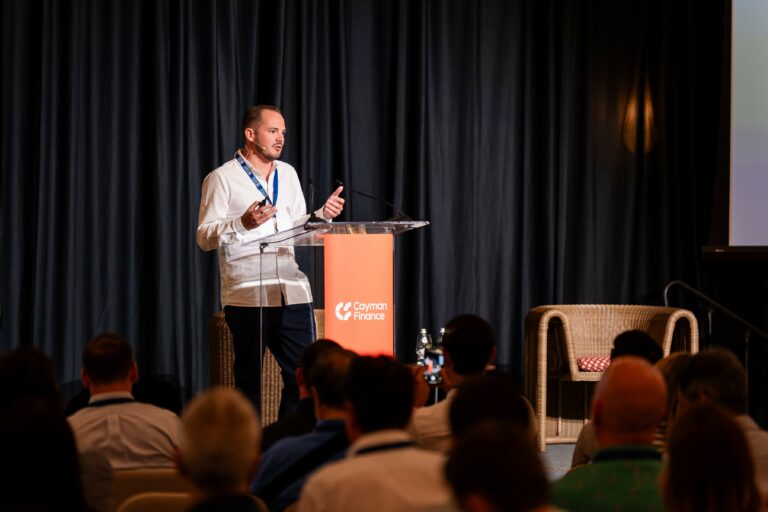
Adam Reeds, co-founder and CEO of Ledn, at the Cayman Finance member event on 11 Sept.
Adam Reeds, co-founder and CEO of Ledn, shared the bitcoin lender’s founding story and highlighted future areas of digital asset financing at Cayman Finance’s third member event of 2024 at Hotel Indigo on 11 Sept.
Reeds, who hails from Ontario, Canada, was first active as an engineer in renewable power development before he transitioned to Bitcoin mining and ultimately bitcoin-backed lending with the creation of Ledn.
“My background in energy brought me to Bitcoin,” he explained, drawing a parallel between energy storage in renewables and bitcoin as a store of value.
In 2018, the key question for Ledn as a business, he told the more than 100 delegates at the event, was why millions of digital asset holders worldwide were not able to borrow against virtual assets in the same way they can using real estate, gold or even artwork as collateral.
Ledn became one of the Cayman Islands’ first registered virtual asset services providers in April 2023 and has since moved its senior management team and corporate headquarters from Canada to Cayman. Today, the company is serving all of its global client base under Cayman’s regulatory framework.
Ledn is offering consumer loans to borrowers who have bitcoin or ethereum but want US dollars, at a ratio of 2:1, meaning that for every $2 of bitcoin or ethereum they post as collateral, clients can borrow $1.
“Our job is to lower the cost of capital on borrowing and on-board institutions that are comfortable with bitcoin as collateral,” Reeds said. “To fund these loans we work with crypto-friendly banks and market makers interested in earning yield on dollars.”
This business is growing at about $1 million per day in an almost fully automated way.
The company’s yield product is the reverse and addresses a niche market of institutions that need to borrow bitcoin or ethereum and clients who want to earn interest on their digital assets. “The use case for this is almost exclusively exchange arbitrage and ETF market making, so we don’t lend to any group that takes price risk,” Reeds said.
Since launching its first bitcoin-backed loan in September 2018, Ledn has focused mostly on lending, incrementally improving its loan product with more features and broadening its asset mix with ethereum and Tether.
So far, Ledn has originated $900 million in retail loans and $5.7 billion in institutional loans.
Having recently moved personally to the Cayman Islands, which forced him “to redo [his] entire financial life”, Reeds said, was a good illustration how the traditional financial system, in contrast to the digital asset world, is largely confined by borders.
Virtual assets in contrast are different. “If I have bitcoin and I have it in self-custody, my private key is stored digitally. There is nothing physical about that. My bitcoin is not Canadian. It’s not Caymanian. It’s bitcoin.”
The same applies to bitcoin-backed lending, where neither the borrower’s jurisdiction nor their credit score are a factor in assessing economic risk. This is not the case for mortgages, and location is still important when borrowing against equities or gold.
As such bitcoin is highly liquid, trades 24/7 and global, Reeds said. “[I am] highly biased, but in my opinion, bitcoin is the most pristine collateral there is.”
However, bitcoin is also misunderstood as an asset class, he conceded. One example for this is that banks are not getting recognition for capital adequacy purposes for the bitcoin they are holding on their balance sheet.
It makes it difficult for banks to lend against bitcoin, if they are getting credit for assets such as real estate but not for virtual assets, Reeds noted.
“So this is something that needs to change,” he said, adding that when it does, “it’s going to be a huge unlock” for virtual assets.













